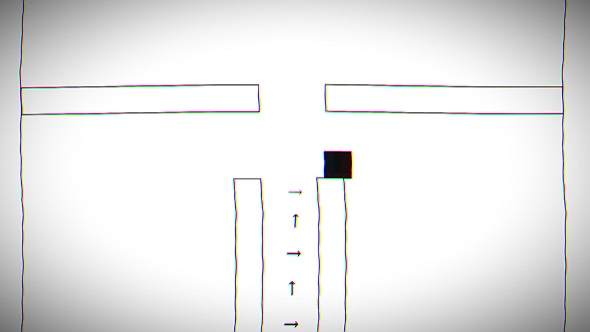
A scene from Abstractism, which allegedly hid a cryptocurrency miner behind an innocuous-looking Steam game.
Valve has removed simple 2D platformer Abstractism from its Steam platform after allegations that the app hid a secret cryptocurrency miner and used misleading item-trading tactics to attract players.
YouTuber SidAlpha highlighted earlier accusations of the game's illicit cryptomining functions in a video this weekend, laying out how the $1 Abstractism increased CPU and GPU usage well beyond the point that a simple 2D line-art game should require. In a forum response on Steam, developer Okalo Union chalked that resource usage up to the "post-processing effects rendering" required when running on high graphics settings, but that claim doesn't really pass the sniff test for a title with such simple visuals.
In addition, a suspiciously named "SteamService.exe" file in the Abstractism's directory reportedly set off many antimalware services for allowing "remote execution of commands," which would be necessary for communicating with a cryptocurrency platform (this shouldn't be confused with the legitimate SteamService.exe executable, which exists in a different folder). In a July 23 Steam update, developer Okalo Union claimed that this file was necessary to control the game's "Inventory Service," which provides randomized item drops, saying directly that the executables "are not Bitcoin miner (and are not Monero miner too, honestly)."
But the game's design also encouraged players to leave it running for up to 40 hours a week, spreading increasingly rare items out with increasingly long gaps in time "if your playtime is long." Circumstantially, that's exactly the kind of system a developer might use to encourage players to leave the game and its associated cryptomining tools running as long as possible.
Shady items
Speaking of those items, a user in the Team Fortress 2 Backpack forums recently noticed at least one Abstractism item was designed as an exact mimic of a rare TF2 "Strange Professional Killstreak Australium Rocket Launcher." The difference between the valuable TF2 item and the relatively worthless Abstractism item might not be apparent in a quick skim of a proposed item trade, leading to ripe potential for trade scamming.
The Abstractism item itself had its description and image edited shortly after the alleged trading scam came to light, but the URL for the original item page still bretrays the original misleading name. Dozens of other Abstractism items contained jokey or meme-worthy content seemingly designed to attract bot-based item farmers, in much the same way as previous games that exploited Steam's trading card system.Mere hours after SidAlpha's video was posted, Valve removed Abstractism and all other Okalo Union games from Steam, banning the developer and publisher Dead.Team in the process. In a statement provided to the press, Valve said the game was removed for "shipping unauthorized code, trolling with content, and scamming customers with deceptive in-game items."
Since Valve's June announcement that it will now only remove "illegal" and "straight up trolling" content from its Steam game listings, there has been some confusion about exactly what content will fall on the "foul" side of that line. Abstractism shows a relatively clear case of the kind of troll-like and malicious content that Valve will disallow, as the company's quick action here shows.Still, the fact that a game like this was able to get on Steam in the first place shows the limits of Valve's current moderation policies, which allow pretty much anyone to put a game on Steam without any prior review. The impact in this case may have been relatively small—Steam Spy estimates that fewer than 20,000 people bought the game before its removal—but it still highlights how there are no guarantees about the true nature of the hundreds of games newly listed on Steam each week. As always, let the player beware.
Read More Valve removes Steam game after allegations of hidden cryptocurrency miner : https://ift.tt/2AswApKBagikan Berita Ini














0 Response to "Valve removes Steam game after allegations of hidden cryptocurrency miner"
Post a Comment